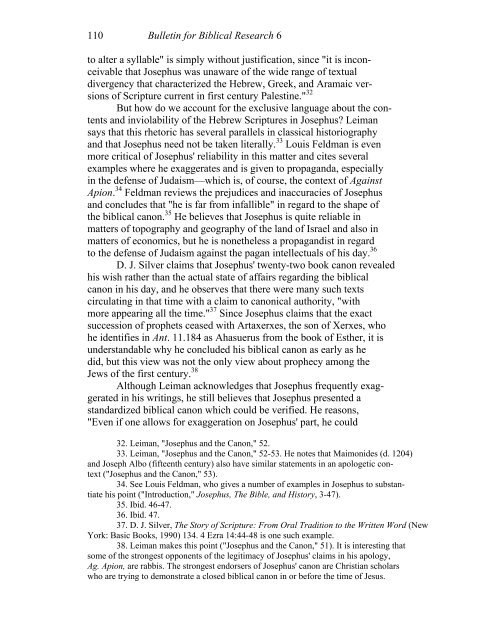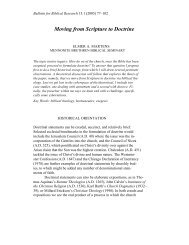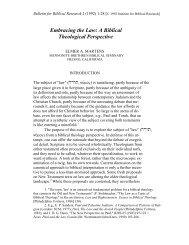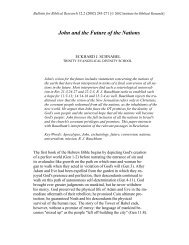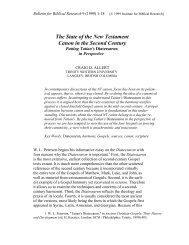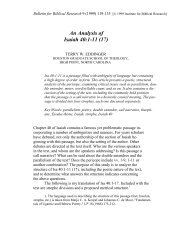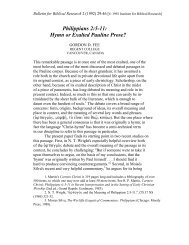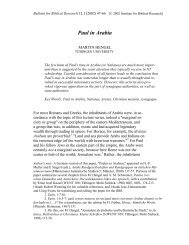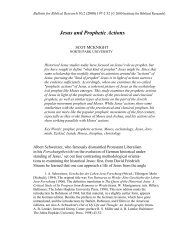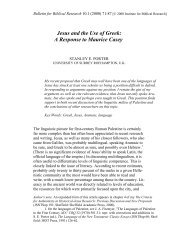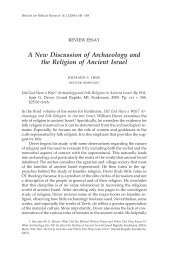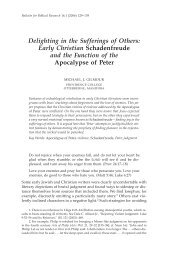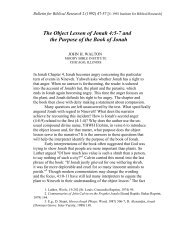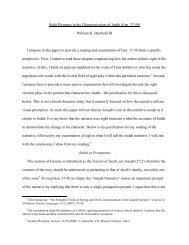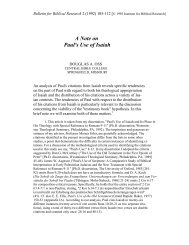The Integrity of the Biblical Canon in Light of Its Historical ...
The Integrity of the Biblical Canon in Light of Its Historical ...
The Integrity of the Biblical Canon in Light of Its Historical ...
You also want an ePaper? Increase the reach of your titles
YUMPU automatically turns print PDFs into web optimized ePapers that Google loves.
110 Bullet<strong>in</strong> for <strong>Biblical</strong> Research 6<br />
to alter a syllable" is simply without justification, s<strong>in</strong>ce "it is <strong>in</strong>conceivable<br />
that Josephus was unaware <strong>of</strong> <strong>the</strong> wide range <strong>of</strong> textual<br />
divergency that characterized <strong>the</strong> Hebrew, Greek, and Aramaic versions<br />
<strong>of</strong> Scripture current <strong>in</strong> first century Palest<strong>in</strong>e." 32<br />
But how do we account for <strong>the</strong> exclusive language about <strong>the</strong> contents<br />
and <strong>in</strong>violability <strong>of</strong> <strong>the</strong> Hebrew Scriptures <strong>in</strong> Josephus? Leiman<br />
says that this rhetoric has several parallels <strong>in</strong> classical historiography<br />
and that Josephus need not be taken literally. 33 Louis Feldman is even<br />
more critical <strong>of</strong> Josephus' reliability <strong>in</strong> this matter and cites several<br />
examples where he exaggerates and is given to propaganda, especially<br />
<strong>in</strong> <strong>the</strong> defense <strong>of</strong> Judaism—which is, <strong>of</strong> course, <strong>the</strong> context <strong>of</strong> Aga<strong>in</strong>st<br />
Apion. 34 Feldman reviews <strong>the</strong> prejudices and <strong>in</strong>accuracies <strong>of</strong> Josephus<br />
and concludes that "he is far from <strong>in</strong>fallible" <strong>in</strong> regard to <strong>the</strong> shape <strong>of</strong><br />
<strong>the</strong> biblical canon. 35 He believes that Josephus is quite reliable <strong>in</strong><br />
matters <strong>of</strong> topography and geography <strong>of</strong> <strong>the</strong> land <strong>of</strong> Israel and also <strong>in</strong><br />
matters <strong>of</strong> economics, but he is none<strong>the</strong>less a propagandist <strong>in</strong> regard<br />
to <strong>the</strong> defense <strong>of</strong> Judaism aga<strong>in</strong>st <strong>the</strong> pagan <strong>in</strong>tellectuals <strong>of</strong> his day. 36<br />
D. J. Silver claims that Josephus' twenty-two book canon revealed<br />
his wish ra<strong>the</strong>r than <strong>the</strong> actual state <strong>of</strong> affairs regard<strong>in</strong>g <strong>the</strong> biblical<br />
canon <strong>in</strong> his day, and he observes that <strong>the</strong>re were many such texts<br />
circulat<strong>in</strong>g <strong>in</strong> that time with a claim to canonical authority, "with<br />
more appear<strong>in</strong>g all <strong>the</strong> time." 37 S<strong>in</strong>ce Josephus claims that <strong>the</strong> exact<br />
succession <strong>of</strong> prophets ceased with Artaxerxes, <strong>the</strong> son <strong>of</strong> Xerxes, who<br />
he identifies <strong>in</strong> Ant. 11.184 as Ahasuerus from <strong>the</strong> book <strong>of</strong> Es<strong>the</strong>r, it is<br />
understandable why he concluded his biblical canon as early as he<br />
did, but this view was not <strong>the</strong> only view about prophecy among <strong>the</strong><br />
Jews <strong>of</strong> <strong>the</strong> first century. 38<br />
Although Leiman acknowledges that Josephus frequently exaggerated<br />
<strong>in</strong> his writ<strong>in</strong>gs, he still believes that Josephus presented a<br />
standardized biblical canon which could be verified. He reasons,<br />
"Even if one allows for exaggeration on Josephus' part, he could<br />
32. Leiman, "Josephus and <strong>the</strong> <strong>Canon</strong>," 52.<br />
33. Leiman, "Josephus and <strong>the</strong> <strong>Canon</strong>," 52-53. He notes that Maimonides (d. 1204)<br />
and Joseph Albo (fifteenth century) also have similar statements <strong>in</strong> an apologetic context<br />
("Josephus and <strong>the</strong> <strong>Canon</strong>," 53).<br />
34. See Louis Feldman, who gives a number <strong>of</strong> examples <strong>in</strong> Josephus to substantiate<br />
his po<strong>in</strong>t ("Introduction," Josephus, <strong>The</strong> Bible, and History, 3-47).<br />
35. Ibid. 46-47.<br />
36. Ibid. 47.<br />
37. D. J. Silver, <strong>The</strong> Story <strong>of</strong> Scripture: From Oral Tradition to <strong>the</strong> Written Word (New<br />
York: Basic Books, 1990) 134. 4 Ezra 14:44-48 is one such example.<br />
38. Leiman makes this po<strong>in</strong>t ("Josephus and <strong>the</strong> <strong>Canon</strong>," 51). It is <strong>in</strong>terest<strong>in</strong>g that<br />
some <strong>of</strong> <strong>the</strong> strongest opponents <strong>of</strong> <strong>the</strong> legitimacy <strong>of</strong> Josephus' claims <strong>in</strong> his apology,<br />
Ag. Apion, are rabbis. <strong>The</strong> strongest endorsers <strong>of</strong> Josephus' canon are Christian scholars<br />
who are try<strong>in</strong>g to demonstrate a closed biblical canon <strong>in</strong> or before <strong>the</strong> time <strong>of</strong> Jesus.


